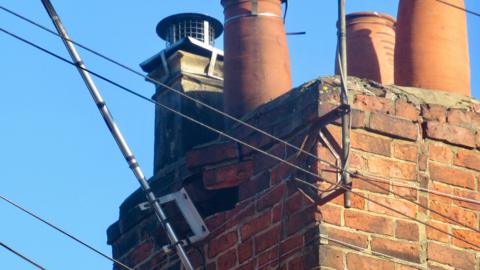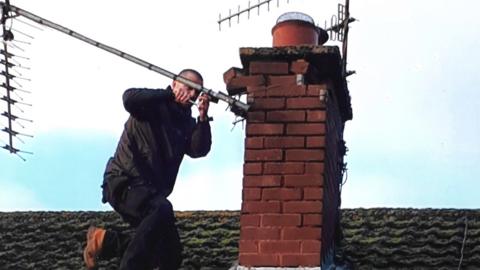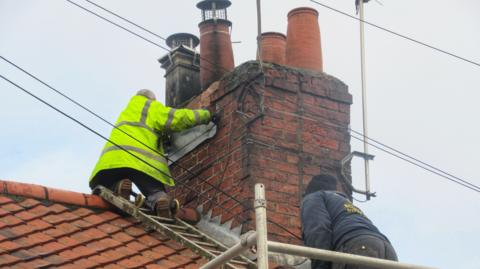In south Wales, Lyndon Witts, 71, said his insurer refused a claim after his roof leaked.
Describing it as "a joke", Mr Witts, of Caerphilly, said his company told him it was "not windy enough and not enough rain fall".


In south Wales, Lyndon Witts, 71, said his insurer refused a claim after his roof leaked.
Describing it as "a joke", Mr Witts, of Caerphilly, said his company told him it was "not windy enough and not enough rain fall".
Angela Clarke, 70, from North Lincolnshire, said the same thing happened to her.
She said: "Our chimney was damaged by a storm and our aerial was blown down.
"Insurance refused to pay, saying the problem was caused by cracks in the flaunching rather than the storm that blew it loose."
Describing her insurance company as "horrendously unhelpful", she said she told them that the chimney stack would not withstand another storm and could potentially fall and injure or kill someone - or come through the roof.
"They really couldn't care less, which left us very distressed," she said.
"Fortunately, the local authority helped us by doing an emergency interim repair after agreeing it could endanger life."

She said one roofer had told her nearly all claims for storm damage to chimneys were being turned down by insurers.
In her case, the chimney cost her more than £1,000 to fix.
Age UK recommends that victims of flooding in particular keep damaged items as evidence, rather than begin the clear-up straight away.
If the first claim is rejected, the ABI urged people to complain to their insurers and if they were still not satisfied to take the case to the Financial Services Ombudsman, which would adjudicate on the claim.
The ombudsman said its service was free and offered consumers a fair and independent ruling on each case.
On its website, it said its general view was "that damage can occur even when the wind speed is lower than level 10 on the Beaufort scale", which starts at 48 knots, or 55mph.
Mr Illife's case shows that insurers can change their minds over claims, with Aegeas saying it had reversed its decision after asking for "additional information".
An ABI spokeswoman said: "Insurers expect bad weather at any time and their priority is always to help their affected customers recover as quickly as possible.
"When assessing a claim for wind damage caused by a storm, insurers will often look to understand if the wind was strong enough to damage an otherwise well-maintained property."
The ABI said every insurer would approach claims differently.
There are agreed minimum levels of understanding for what constitutes a storm, but insurers can still use their own definitions.
With more frequent and severe weather events, the ABI said it was important building resilience was improved and buildings were constructed to a standard that could withstand stronger winds.